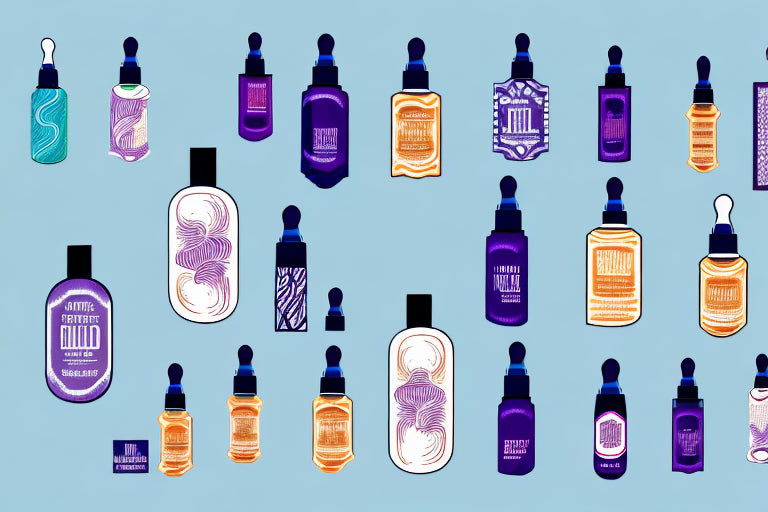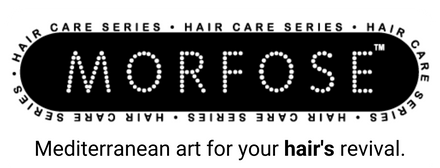The Best Hair Oils for Frizzy Hair: A Comprehensive Guide
Posted by MORFOSE COSMETICS

The Best Hair Oils for Frizzy Hair: A Comprehensive Guide
Are you someone who struggles with frizzy hair? Do you find that, no matter how much you try to tame it, your hair always seems to have a mind of its own? If so, you're not alone. Frizzy hair is a common problem that many people face, and the good news is that there are plenty of hair oils out there that can help.
Understanding Frizzy Hair
Before we dive into the best hair oils for frizzy hair, let's first take a closer look at what causes frizz in the first place.
Frizz occurs when the cuticle layer of your hair becomes raised, allowing moisture to enter and swell the strands. This can happen for a variety of reasons, including humidity, dryness, damaged hair, and chemical treatments. Humidity is a major culprit of frizz because it causes the hair to absorb moisture from the air, making it swell and become frizzy. Dryness, on the other hand, can be caused by a lack of moisture in the hair, which can be due to overwashing, using harsh shampoos, or using heat-styling tools without proper protection. Damaged hair, such as split ends or breakage, can also lead to frizz because it makes it harder for the hair to retain moisture. Finally, chemical treatments, such as coloring or relaxing, can weaken the hair and cause it to become frizzy.
The Science Behind Frizz
Frizzy hair is not only a cosmetic issue, but it is also a result of the physical structure of your hair. Each hair strand is made up of three layers: the cuticle, cortex, and medulla. The cuticle is the outermost layer and is responsible for protecting the inner layers from damage and locking in moisture. When the cuticle is damaged or raised, it makes it more difficult for your hair to retain moisture, leading to dryness and frizz. The cortex is the middle layer and is responsible for the strength and elasticity of the hair. The medulla is the innermost layer and is only present in thick hair.
When the cuticle is raised, it allows moisture to enter the hair shaft, which causes the hair to swell and become frizzy. Additionally, when the cuticle is damaged, it can also lead to breakage, split ends, and other forms of damage.
How Hair Oils Help Tame Frizz
Hair oils are a great way to combat frizz and tame unruly hair. They work by penetrating the cuticle and providing a protective layer, which helps to lock in moisture and prevent further damage. Many hair oils also contain antioxidants and essential fatty acids, which can help to nourish and strengthen your hair.
Some of the best hair oils for frizzy hair include argan oil, coconut oil, jojoba oil, and almond oil. Argan oil is rich in antioxidants and vitamin E, which can help to nourish and protect the hair. Coconut oil is great for moisturizing and strengthening the hair, while jojoba oil is known for its ability to mimic the natural oils in the hair, making it a great choice for those with oily hair. Almond oil is also rich in vitamin E and can help to nourish and strengthen the hair.
When using hair oils, it's important to apply them correctly. Start by applying a small amount to the ends of your hair and working your way up to the roots. Avoid applying too much oil, as this can weigh down your hair and make it look greasy. Additionally, be sure to choose a hair oil that is appropriate for your hair type and needs.
By understanding the causes of frizzy hair and using the right hair oils, you can achieve smooth, manageable hair that looks and feels healthy.
Types of Hair Oils for Frizzy Hair
Frizzy hair can be a real challenge to manage. It can be difficult to style and often looks dull and lifeless. Fortunately, there are many different types of hair oils that can help tame frizzy hair and restore its natural shine and vitality.
When it comes to choosing a hair oil for your frizzy hair, there are several options to choose from. These include natural oils, synthetic oils, and oil blends. Each type of oil has its own unique properties and benefits, so it's important to choose the one that's right for your hair type and needs.
Natural Oils
Natural oils are derived from plants and are often praised for their moisturizing and nourishing properties. These oils are rich in vitamins, minerals, and antioxidants that can help repair and protect hair from damage. Some popular natural oils for frizzy hair include:
- Argan oil: Argan oil is extracted from the kernels of the argan tree and is rich in fatty acids and vitamin E. It can help moisturize and protect hair from damage caused by heat styling and environmental factors.
- Jojoba oil: Jojoba oil is extracted from the seeds of the jojoba plant and is similar in composition to the natural oils produced by the scalp. It can help regulate oil production, moisturize hair, and prevent breakage.
- Coconut oil: Coconut oil is extracted from the meat of mature coconuts and is rich in fatty acids that can penetrate the hair shaft and moisturize hair from within. It can also help reduce protein loss and prevent hair damage.
- Olive oil: Olive oil is extracted from the fruit of the olive tree and is rich in antioxidants and fatty acids that can help nourish and protect hair. It can also help improve hair elasticity and prevent breakage.
- Grapeseed oil: Grapeseed oil is extracted from the seeds of grapes and is rich in antioxidants and vitamin E. It can help moisturize hair, reduce frizz, and protect against heat damage.
Synthetic Oils
Synthetic oils are man-made and are often used in hair care products due to their lightweight texture and ability to provide shine. These oils are usually made from petroleum-based ingredients and are designed to mimic the properties of natural oils. Some popular synthetic oils for frizzy hair include:
- Cyclomethicone: Cyclomethicone is a clear, odorless silicone oil that can help improve hair texture and provide shine. It is often used in hair styling products and can help reduce frizz and flyaways.
- Dimethicone: Dimethicone is a silicone oil that can help smooth and protect hair from heat damage. It is often used in hair serums and can help reduce frizz and improve hair manageability.
- Mineral oil: Mineral oil is a lightweight, odorless oil that can help moisturize and protect hair from damage. It is often used in hair care products and can help reduce frizz and improve hair shine.
- Isopropyl myristate: Isopropyl myristate is a synthetic oil that can help improve hair texture and provide shine. It is often used in hair care products and can help reduce frizz and improve hair manageability.
Oil Blends
Oil blends are a combination of natural and synthetic oils and can provide the benefits of both. These blends often contain a mixture of oils and are intended to provide a customized solution for different hair types. They can help moisturize, protect, and nourish hair, while also reducing frizz and improving manageability. Some popular oil blends for frizzy hair include:
- Macadamia Oil Blend: This blend contains macadamia oil, argan oil, and other natural oils that can help moisturize and protect hair from damage. It can also help reduce frizz and improve hair shine.
- Moroccan Oil Blend: This blend contains argan oil, jojoba oil, and other natural oils that can help nourish and protect hair from damage. It can also help reduce frizz and improve hair manageability.
- Coconut Oil Blend: This blend contains coconut oil, grapeseed oil, and other natural oils that can help moisturize and protect hair from damage. It can also help reduce frizz and improve hair shine.
Overall, choosing the right hair oil for your frizzy hair can make a big difference in the health and appearance of your hair. Whether you prefer natural oils, synthetic oils, or oil blends, there are many options to choose from that can help you achieve the smooth, shiny, and manageable hair you've always wanted.
Top Hair Oils for Frizzy Hair
Now that you know more about the different types of hair oils available, let's take a look at some of the best options for taming frizz.
Argan Oil
Argan oil is a popular choice for frizzy hair due to its lightweight texture and high vitamin E content. It helps to nourish and moisturize your hair, leaving it soft and shiny without weighing it down.
Coconut Oil
Coconut oil is another great option for frizzy hair. It is rich in fatty acids and has antimicrobial properties, which can help to strengthen your hair and protect it from damage caused by external factors.
Jojoba Oil
Jojoba oil is a great choice for those with fine or oily hair. It is lightweight and mimics the natural oils that your scalp produces, which can help to regulate oil production and reduce frizz.
Olive Oil
Olive oil is a natural emollient, which means it can help to lock in moisture and prevent your hair from becoming dry and brittle. It also contains antioxidants, which can help to protect your hair from damage caused by free radicals.
Grapeseed Oil
Grapeseed oil is lightweight and non-greasy, making it a great choice for those with fine or thinning hair. It contains high levels of vitamin E, which can help to nourish and protect your hair from damage.
How to Choose the Right Hair Oil for Your Hair Type
When selecting a hair oil for your frizzy hair, it's important to choose one that is best suited for your hair type. Here are some tips to help you pick the right one:
Fine Hair
If you have fine hair, look for lightweight oils like jojoba, grapeseed, or argan oil. These oils won't weigh down your hair and can help to add moisture without making your hair look greasy.
Thick Hair
Those with thick hair may benefit from heavier oils like coconut or olive oil. These oils are rich in nutrients and can help to tame frizz and smooth your hair.
Curly Hair
Curly hair tends to be naturally drier and more prone to frizz, so look for oils that can help to moisturize and define your curls. Argan oil and coconut oil are both great options.
Coarse Hair
Coarse hair can benefit from heavier oils like olive or avocado oil, which can help to add moisture and shine. Look for oils that are rich in fatty acids and antioxidants to help nourish and hydrate your hair.
Conclusion
Frizzy hair can be a frustrating problem, but with the right hair oil, you can tame those unruly strands and enjoy smoother, healthier-looking hair. Whether you opt for a natural oil, synthetic oil, or oil blend, be sure to choose a product that is best suited for your hair type and needs.



